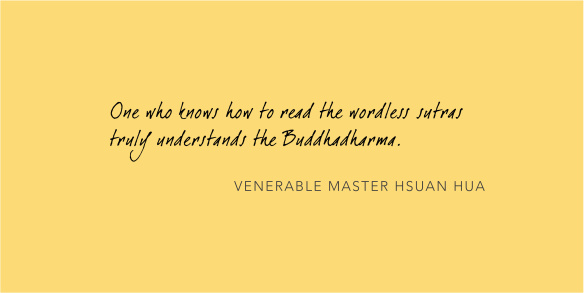
About thirty students from Humboldt State University came to visit the City of Ten Thousand Buddhas last weekend, to participate in the monastic lifestyle as an educational experience. I was asked to guide the group around campus, and I also sat in on the Q&A sessions that the Ciity held for them, so I had a great opportunity to field questions about Buddhism—and the students had lots of tough questions to ask—everything from “So, if sexual desire and rebirth are a problem, what about birth control?” to “Buddhists are so individualistic, so what do they think about Anarchists?” to “Have you considered that Buddhist views on gender might just be cultural constructions?”
In hindsight it’s actually pretty funny to be put on the spot as the token “Buddhist” when I have a lot of the same questions. In the moment, though, it was fairly terrifying. I took a deep breath. “These are really good questions,” I told myself; and I wasn’t sure if I really had the best answers, but in the moment, I thought I’d at least take a crack at it. Looking back, the best “answer” I could give was probably just to remember to breathe.
… for those of us who are still working on cultivating a perfect understanding of the causal structure of reality, I think it would help more if we tried to understand ourselves first ….
Luckily for me, I don’t really believe that Buddhism has any Truth with a capital “T.” The greatest treasure is rather a kind of capacity of presence that lacks existential anxiety and habitual emotions. Perhaps because of this, the wisdom of the sutras tends to be presented more often in the form of a set of hand tools than a pair of stone tablets, with the highest wisdom coming in the form of no-form, of total non-conceptuality. Not to say that what happens in our conceptual mind might, every once in a while, happen to bear some similarity to what is needed externally. That’s great when it happens, but for those of us who are still working on cultivating a perfect understanding of the causal structure of reality, I think it would help more if we tried to understand ourselves first, before assuming to know something about the Truth. So my answers tended to be more of the “chop wood, carry water” variety. Live your life; look at where you’re going; figure out what’s going to help. In the Dharma, philosophy is only important when it helps to orient the mind towards the present world in an intentional way. Anything that looks like a “doctrine,” the way we normally think of the word, should always be placed in this context.
I’ve grown to appreciate that things like planting potatoes and having a nice conversation can actually be really profound if you’re willing to appreciate it that way.
At one point Saturday afternoon, while planting potatoes in one of the fields on the farm, I was talking to one of the students about why they came to visit. We ended up talking about spiritual seeking, about how we both went to college with a feeling that there was some kind of underlying importance that had something to do with spirituality, that what college had taught us was that there are a lot of conflicting perspectives out there about what’s really true, and that any underlying meaning was a mystery, lying somewhere in the puzzle of these perspectives. For myself, the experience of seeking and not finding eventually led me to the conclusion that what I was looking for wasn’t really a “figure it out” kind of thing. Since then, I said, I’ve grown to appreciate that things like planting potatoes and having a nice conversation can actually be really profound if you’re willing to appreciate it that way. I happened to turn my head as I said this and noticed that a handful of students had gathered to listen to the conversation. There was something in the air too, a sense of appreciative attention.
Maybe it was just me, but I felt a kind of reverence in the air at that moment. I think maybe the combination of the fields, the sunshine, and the honesty between two people had managed to stir up a little bit of wisdom.
